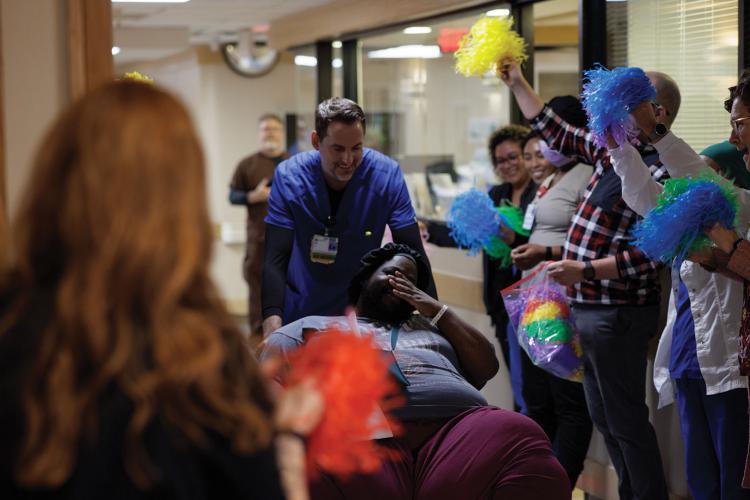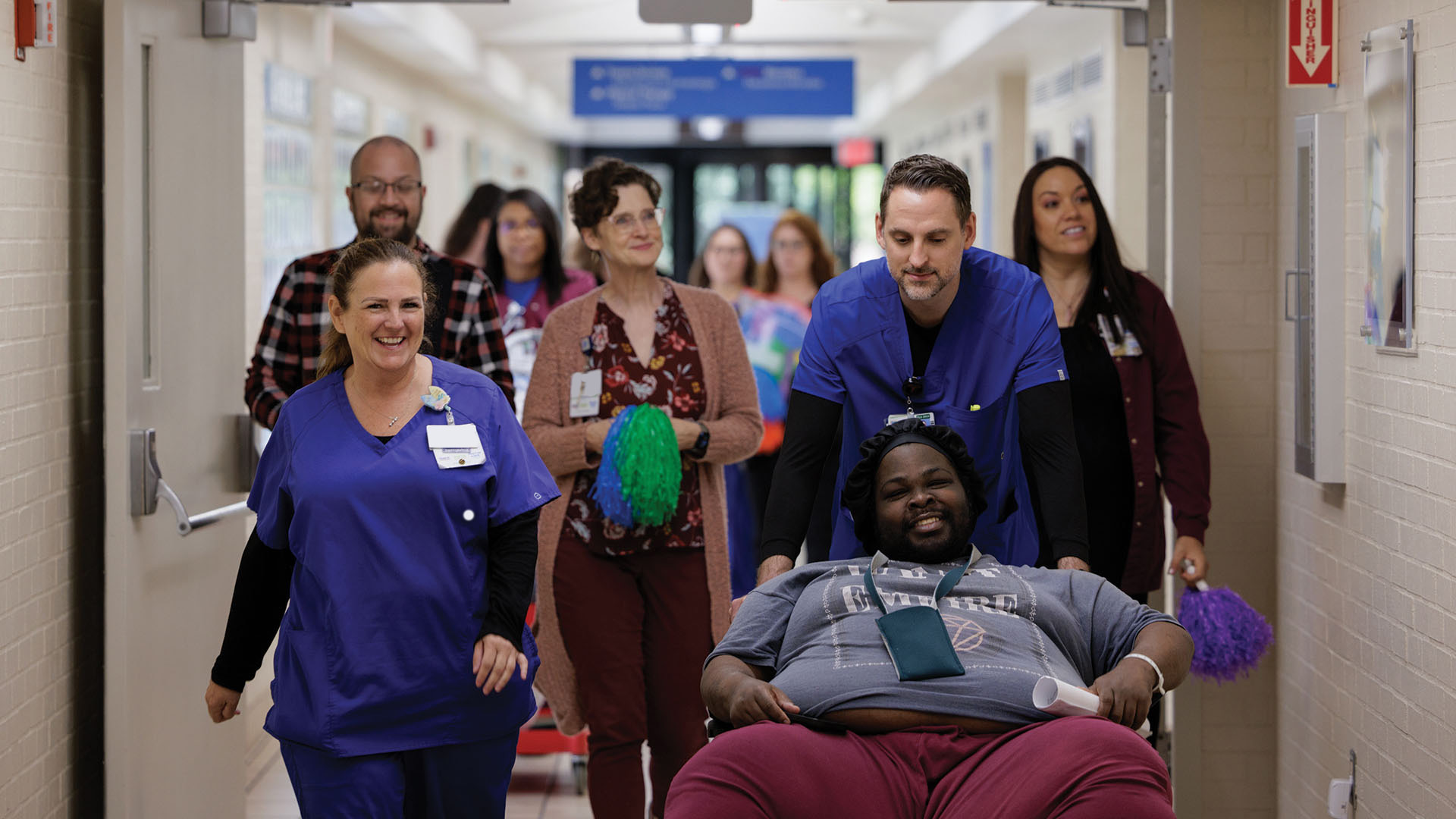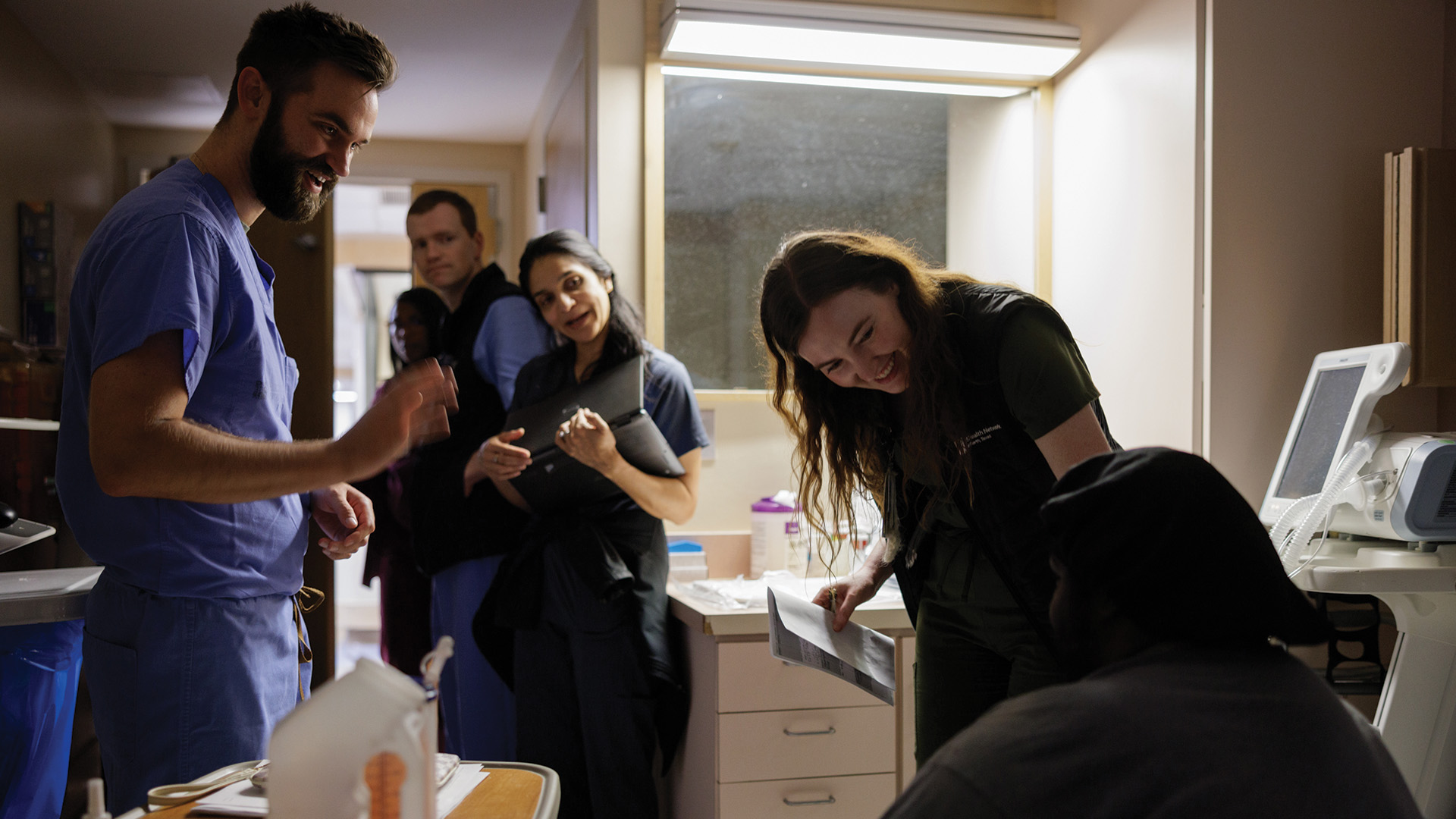
Darius Walker was a patient at JPS Health Network for nearly four months. During these four months, Walker faced many obstacles and challenges. Still, no matter what the days ahead held for him, he walked triumphantly down his road to recovery.
On February 2, 2024, Walker was brought into the Emergency Department at JPS. Unknowingly, he was suffering from a total hip dislocation in both of his hips, leaving him in a split-like position and unable to walk.
Walker’s journey before finding care at JPS had been an ongoing battle. In 2020, he found out that he had a condition known as lymphedema. Lymphedema refers to tissue swelling in the body caused by fluid entrapment. When left untreated, the condition can become cellulitis and drastically affect one’s body.
In the months leading up to February, Walker was seen for cellulitis in the legs and feet. The swelling became so significant that he quickly began to lose his ability to operate independently.
“The pain got to a point where it hurt too bad to move. I sat down, and I didn’t want to get back up. The swelling in my legs and feet had become too much for me to take, so I sat in the only comfortable position I could find,” Walker said.
Walker remained in this position at home for three months. During these three months, he relied on his family to help shower him, feed him, and use the bathroom. Besides this, Walker slept often to try to subdue the pain.
With each passing day, he began feeling his independence slip away. A once healthy and active young man was now entirely dependent on his mother to help him daily. Walker’s loss of independent function led him on a path to emotional decline.
“At the time, I felt it was all my fault. I’ve always been able to do everything on my own; that’s just how I was raised. I kept asking myself, ‘How could I let myself get so low?’ All I wanted to do was give up,” said Walker.
But much like the rest of Walker’s story, he never gave up. In February, Walker’s mother encouraged him to get off the floor and start moving again. This is when he realized something was seriously wrong. Despite how hard he tried, each movement sent him into immense pain.
“Leaving is bittersweet. I am so thankful for JPS and everyone who was part of my journey. JPS became my home, and the people here are like my family. I’ll miss the support I received here, but I’m excited to return to living how Darius Walker wants to. It’s not over yet.”
“When it became time to move around, I heard my bones popping. I kept trying, but there was just a rush of pain going through my body. The insides of my feet felt like they were burning, and I couldn’t move. I told my mom it was time to call the ambulance,” Walker said.
Still in the same position, the paramedics were able to place him on a gurney. Walker was on his way to JPS, unsure of what would come. Upon his arrival, the harsh reality of his condition began to settle in.
“I remember people looking at me come in and whispering to one another. I didn’t fit on the bed correctly because of how I had to sit. The rooms were too small for me to be comfortable in. All of the nurses were trying their best to accommodate my situation, but the truth is that I think everyone was concerned,” said Walker.
Once settled into a suitable room, Walker began to speak with medical personnel. His care began with X-rays on both of his hips, which would later show the total dislocation. The dislocation had prevented him from moving into any other position than the one he had been in for months. Walker was told he would need surgery to fix this issue.
“I was so shocked. Months ago, I was walking, getting up, doing whatever I needed to do. Now, I’m here, unable to walk. I needed to have surgery. It felt so unreal,” Walker said.
However, the surgery that Walker required had been put on hold once the medical team discovered his weight. With independence decreasing, it became harder for Walker to maintain his weight, especially in correspondence to his previously diagnosed Type 2 Diabetes. The substantial weight gain made having surgery a hazard for Walker, so his journey to recovery began with focusing on dietary changes.
“The first few weeks I was here, they ran tests, gave me medicine, and ensured I ate correctly. There wasn’t much else that could be done until I was ready for surgery,” Walker said.
The time came for the surgery that Walker had patiently waited for. Initially, the plan was to operate on both thighs in hopes of removing some fluid to reduce tissue swelling. However, the medical team decided it would be in Walker’s best interest to do two separate operations, focusing on one leg at a time.


After the first surgery, Walker was informed that the amount of fluid and swelling in the leg prevented the surgeon from continuing the operation. He discovered that the second thigh would not receive the same surgery. Again, he was back at square one.
“At the end of the day, it all came down to my weight. I was scheduled for gastric bypass, but they decided not to do it because of my weight. I could tell they were trying to figure out what they could do to help me, but they were running out of options,” Walker said.
As physicians and nurses began to consider the options for Walker, it was decided that he would be moved to Palliative Care where he could receive emotional support and daily assistance and manage his case. Initially, Walker was transferred with the intent to perform surgery once his weight stabilized.
Walker’s move changed things – life became brighter. In the first weeks of being with his new care team, he started feeling like he was getting better. He had safely undergone treatments to remove blood clots, he was practicing his new diet, and, most importantly, he began receiving the emotional support that he craved.
Walker was introduced to Chaplain Benton Berghuis and Kelle White, Social Worker, Palliative Care. Berghuis and White quickly became essential characters in Walker’s story.
“Benton and Kelle were persistent. At first, we only made small talk. Then, I realized that I could trust them. They wanted me to get better. I would talk to them no matter what kind of day I was having, and they kept me in good spirits,” said Walker.
Forming a support system for Walker was vital to his recovery. Everything being done to help Walker get better was done of his own accord. He was the one making changes to his diet, moving as much as he could, and trying to lose weight. At this point, his care team was there to support his efforts and encourage him.
“It was apparent that Darius would be here for quite some time. Protecting his dignity and providing emotional support was crucial for him to recover. Many people don’t have a ‘safe person’ to turn to, so we committed to being that for Darius,” Berghuis said.
Validating Walker’s feelings motivated him to get his life back on track. Slowly, he began to talk more, smile often, and visualize his progress. No matter how frequently plans changed for Walker’s care or what obstacle crossed his path, he remained resilient.
Walker began to lose weight and feel more like himself. As time went on, he began to regain independence. At the beginning of his admittance to JPS, Walker could not move alone. With the help of multiple nurses, he would be repositioned in his hospital bed. Losing weight allowed Walker to start making these adjustments on his own.
Eventually, Walker became so capable that he only required the assistance of one technician. Still awaiting approval for surgery, Walker was focused on making great strides toward weight loss. One afternoon, during his routine cleaning, Walker felt a sudden wave of peace and confidence.
“I turned over, and normally, I felt a little pain, but this day, I just felt normal. I told my nurse I felt like I could walk, hold my leg up, and stretch,” Walker said. “I can’t describe it, but something told me I could move my legs again.”
With the hip dislocation, Walker could not have moved his legs beyond certain boundaries. He trusted his instinct and demonstrated to his nurse that movement was no longer restricted. Astounded, the nurse urged Walker to ask for a second X-ray.
“It didn’t hurt to ask. The worst that the doctors could have told me was that my hips were still dislocated. I shouldn’t have been able to move that way, but I didn’t feel any pain. I had to trust my instinct and ask for the second X-ray,” Walker said.
Within the day, the medical team was able to conduct imaging at Walker’s request. The images showed that there was no longer a dislocation in either hip. Because of Walker’s diligence and compliance with his care plan, he was able to resolve the issue on his own. Walker no longer needed surgery.
“Throughout his time here, Darius began seeing the potential for his life to change positively. He could see a promising future again,” White said. “He found that motivation inside and ran with it. He saw that he could do hard things, and nothing would stand in the way of him getting better.”
In time, Walker began seeing a physical therapist and relearning how to do things on his own. He practiced sitting, standing, and turning, and eventually, he began to walk. Walker came to JPS with zero hip functionality. With patience and persistence, his walking ability increased to 70 percent.
“There was hardly a time that Darius said no to doing something. Even if he did, he would change his mind and do it. He was so cooperative, and you could tell that he was determined to get better,” said Gabby Dixon, Multiskilled Technician, Palliative Care.
The Palliative Care team commended Walker for his joyful and courageous spirit through adversity. No matter what was happening with his case, he was always a positive person to be around.
“Darius has such a positive outlook on life. Despite everything he was going through, he always showed our team kindness and appreciation. Seeing the smile on his face and watching him accept our help was heartwarming,” said Holly Perry, RN, Palliative Care.
Walker’s road to recovery is far from over, but his case is a testament to hard work paying off. Walker entered JPS completely immobilized and with no hope other than surgery. He has now been discharged with the ability to walk, substantial weight loss, and an inspiration to maintain a new lifestyle.
“I feel at peace now. I’m no longer in uncontrollable pain. This lifestyle will be new to me and will take getting used to it, but I am excited to focus on what’s to come,” Walker said. “Leaving is bittersweet. I am so thankful for JPS and everyone who was part of my journey. JPS became my home, and the people here are like my family. I’ll miss the support I received here, but I’m excited to return to living how Darius Walker wants to. It’s not over yet.”
